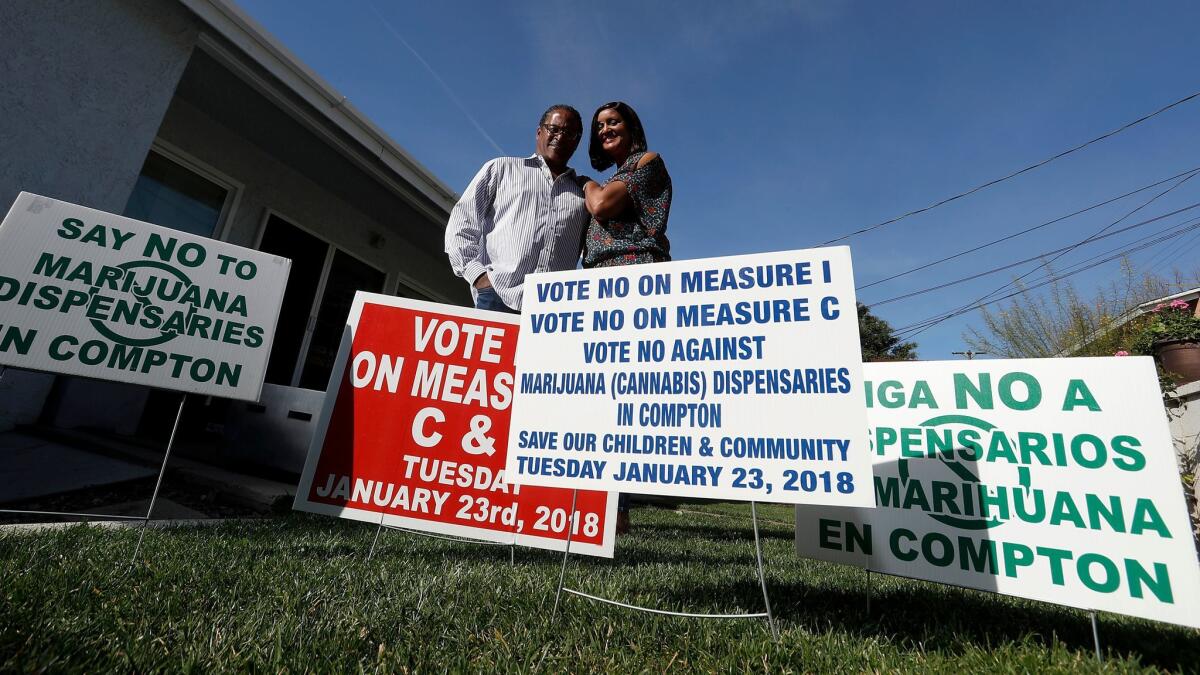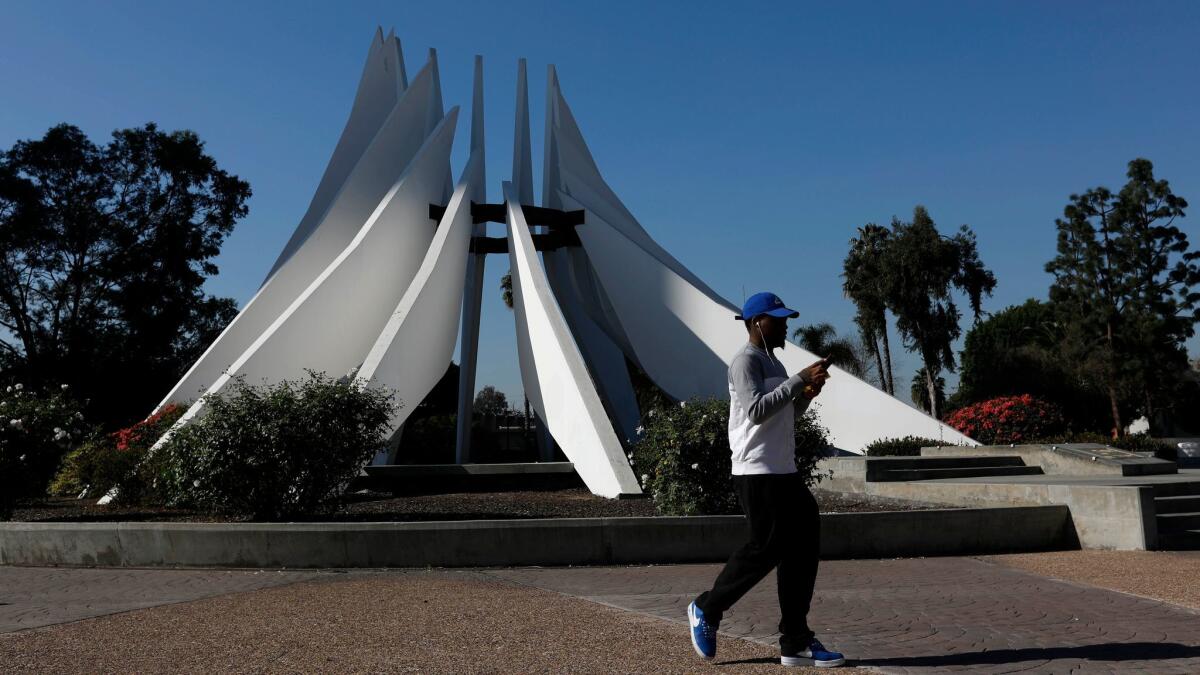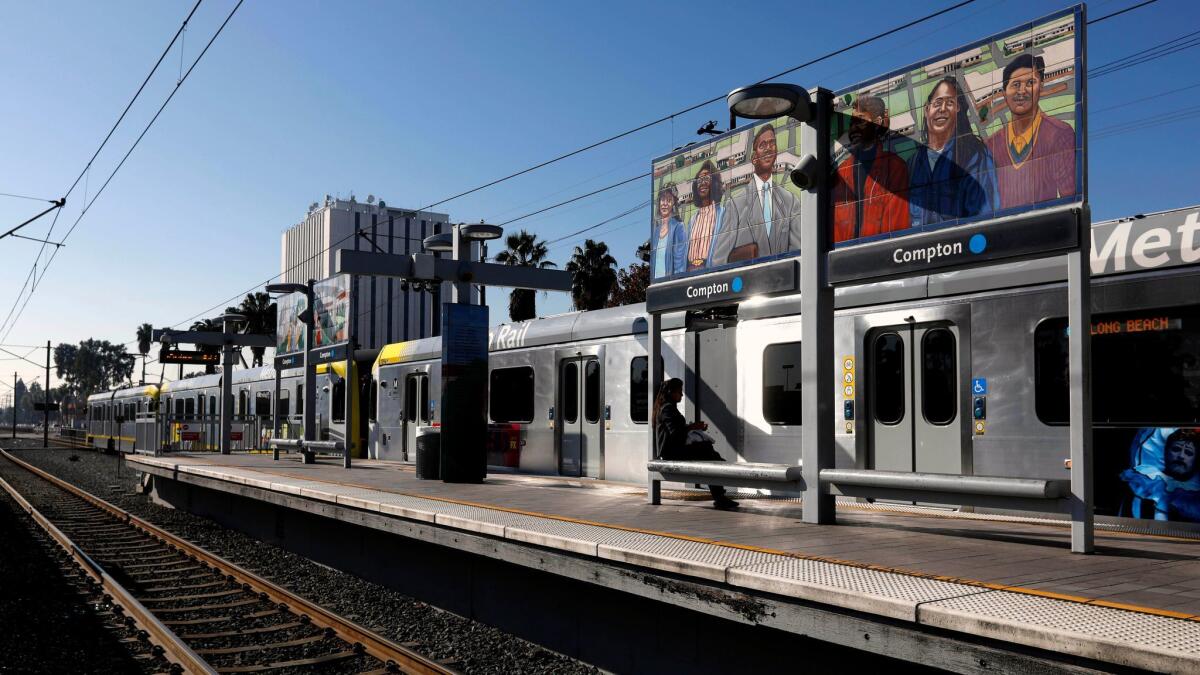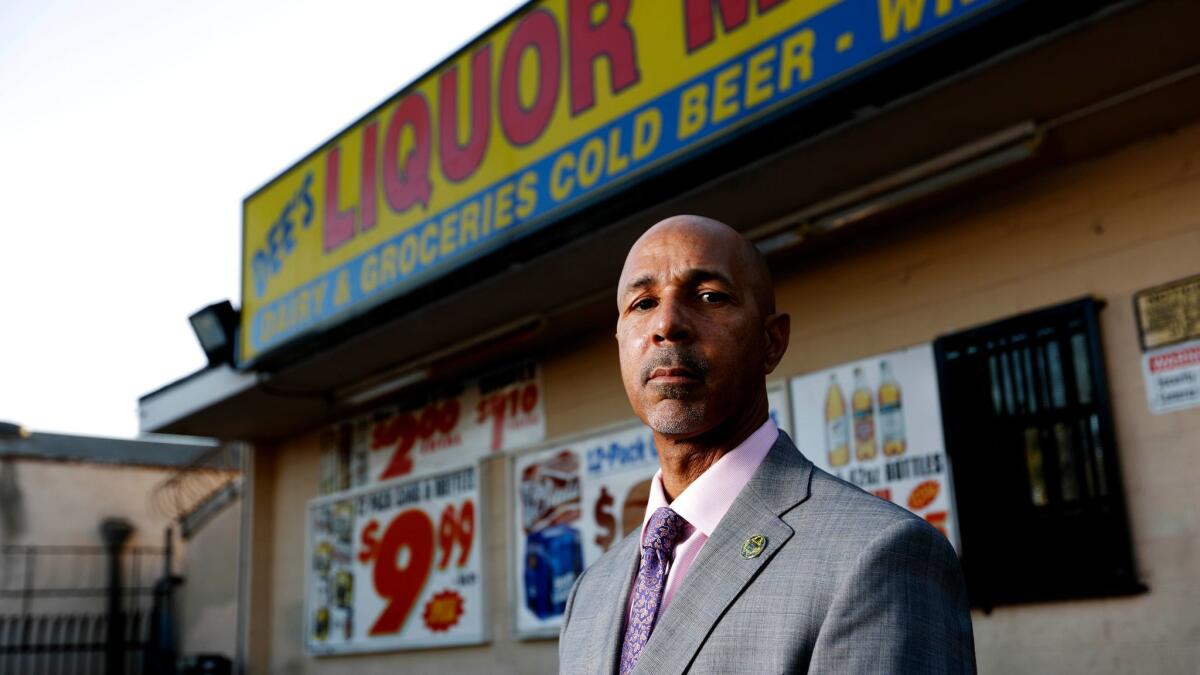Compton gave the world ‚ÄėThe Chronic‚Äô ‚ÄĒ but rejects marijuana sales despite legalization
Of the many cultural touchstones born on the streets of Compton, one of the most lasting is ‚ÄúThe Chronic.‚ÄĚ
Dr. Dre’s classic 1992 album brought the nickname for high-grade cannabis into the mainstream, and, to the disdain of many Compton residents, cemented the city as the home of West Coast gangsta rap. It also gave marijuana one of its biggest pop culture endorsements since Bob Marley appeared on an album cover smoking a joint.
But if you’re looking to buy the chronic legally, don’t come to Compton.
Last week, while cities across the state were giving the green light to pot shops to sell recreational cannabis, Compton voters overwhelmingly rejected proposals to allow recreational and medicinal sales in the city.
To some outsiders, it might be a surprise that Compton would close the doors on pot sales and the tax revenue they bring. But after decades of black Americans being cast as the face of the underground pot market, Compton and other Southern California cities with large African American populations have opted against legalizing the pot trade, worried about the effects on the community and the message it sends.
‚ÄúDrugs have pillaged black and brown communities,‚ÄĚ said James Hays Jr., a 61-year-old community activist who opposed legal pot in Compton. ‚ÄúIt has taken all of our talent away from us. It makes our neighborhoods bad neighborhoods to live in.‚ÄĚ

James T. Butts, mayor of Inglewood, another city with a large black population, said he would rather create jobs ‚Äúthe good old fashion way‚ÄĚ by attracting development and generating ‚Äúconstruction jobs with training programs and local hiring goals that resulted in people being hiring and getting skills they didn‚Äôt have before.‚ÄĚ
Butts, a former police chief with 37 year of experience, said pot shop owners would hide sales to make up for the 45% taxes levied on recreational cannabis and the overhead costs of leasing and staff. Worse, he said, they move into ‚Äúragtag buildings‚ÄĚ and don‚Äôt invest in the property, thus dragging down the appearance of a neighborhood.
Critics in Compton expressed similar concerns.
‚ÄúThe voters in Compton decided this decision was the healthiest and most forward-looking for our community,‚ÄĚ said Councilwoman Emma Sharif, who was the lone council member to vote against both items.
The city estimated it would have cost $6 million to hire staff to process applications and to beef up law enforcement, she said. Additionally, she worried that the all-cash business could have led to robberies or worse.
‚ÄúI don‚Äôt believe bringing marijuana into the community would‚Äôve been good for the community,‚ÄĚ she said.
In Compton, petitioners gathered more than 8,500 signatures to get Measure I on the ballot and force the Jan. 23 special election. The voter initiative, which was backed by the cannabis industry, called for a 5% sales tax and from seven to 10 dispensaries and would’ve allowed indoor marijuana-cultivation businesses.
The city drafted a competing bill that would have increased the sales tax to 10%, banned commercial cultivation, included local hiring mandates, called for stricter zoning and capped the number of dispensaries at 10.
Both measures failed to pass by a 3-to-1 margin.

Dermot Givens, an attorney specializing in marijuana licensing, said Compton voters are trying to distance themselves from the city’s history instead of trying to cash in on it.
‚ÄúThey want to be the All-American Compton,‚ÄĚ he said, but ‚Äúeverybody in the world knows that if you go to Compton there are gangs and weed. True or not true. That‚Äôs the image.‚ÄĚ
Givens said Compton could have capitalized on the notoriety and become famous for its weed.
‚ÄúCompton should want to capture the marijuana market and brand it just like the wines and champagne,‚ÄĚ he said. ‚ÄúClaim it. We got the best weed in the world. They would make a fortune. Like Cognac,‚ÄĚ a region of France where its namesake brandy originates.
The discussion over legalizing cannabis comes at a time when Compton is making headway in rebranding itself. Violent crime has plummeted in the last two decades, the city has attracted new development, and home prices are on the rise.
And unlike previous administrations, city leaders now want to celebrate the city‚Äôs musical heritage ‚ÄĒ from Dr. Dre to Kendrick Lamar ‚ÄĒ but without glorifying the way Compton was depicted in early gangsta rap albums such as ‚ÄúThe Chronic‚ÄĚ and N.W.A‚Äôs ‚ÄúStraight Outta Compton.‚ÄĚ
Tax revenue from the pot trade could help improve infrastructure or help balance the budget, Givens added.
According to an analysis by New Frontier Data of the state’s highest-grossing counties for medical marijuana sales, the therapeutic pot trade brought in on average $6.20 in tax revenue per resident in 2016. Even excluding the potential tax haul from recreational pot sales, that’s no small sum for Compton, a city of about 100,000 people.
But Sharif said the drawbacks outweighed any potential tax benefits the city would’ve collected.

For Hays and his wife, Charmaine, the two ballot measures might as well have been neon green signs that read ‚ÄúCome to Compton for the best weed.‚ÄĚ
So the lifelong Compton couple put up their own signs with ‚ÄúSay No to Marijuana Dispensaries in Compton‚ÄĚ to encourage voters to strike down the measures. They assembled a group of 30 to 40 volunteers and went door to door raising safety concerns.
‚ÄúWe looked at this as an affront because of the conditions in Compton and its past,‚ÄĚ said James Hays, the founder of two biomedical companies.
James recalls an idyllic childhood growing up in Compton. The downtown business district was booming and the city housed three movie theaters including a drive-in, a miniature golf course and shops. As a teenager, he walked from his job at the Montgomery Ward in Lynwood to his home in the west side of Compton without fear.
He acknowledged that gang violence loomed in the background, but it was not a constant.
That‚Äôs why it still bothers him that Dr. Dre and Easy-E created ‚Äúa false impression of our city.‚ÄĚ
Black people make up a third of of Compton residents, but more than half of registered voters, according to Political Data Inc. While the median age of residents is under 30, almost half of the city’s voters are over 45.
Jaime Regalado, professor emeritus of politics at Cal State L.A., said there’s a lingering perception among the older populace, particularly in black and Latinos communities, that cannabis is a mind-altering drug far different from alcohol.
‚ÄúIt‚Äôs still tinged as a gateway drug and a gateway to other things like harder drugs and crime,‚ÄĚ he said.
Virgil Grant, a Compton native and a leading cannabis entrepreneur, brags about supplying Compton with ‚Äúthe chronic.‚ÄĚ He used to deal from behind the counter of Dee‚Äôs Liquor Market, a chain of Compton stores he use to run with his father.
‚ÄúI was the reason Compton had the best weed,‚ÄĚ said Grant, a supporter of legalized pot but a critic of the ballot measures. ‚ÄúDre, Snoop, Pac, all of them were smoking my weed.‚ÄĚ (Dr. Dre, a Compton native, could not be reached for comment.)

Busted more than two decades ago with two nickel bags and violating probation, Grant served 14 months of a two-year term. In 2008, after California voters legalized medical marijuana, federal agents raided one of his six dispensaries. He took a plea and was sentenced to six years in prison.
Since then, Grant has become a leading voice in advocating for pathways for black people to get into the mostly white legal cannabis game.
Grant said the two measures were flawed. He lobbied the City Council to add a social equity component that would have allowed nonviolent felons like himself to get a slice of the multibillion-dollar cannabis business.
He wanted Compton‚Äôs city ordinance, Measure C, to allow the cultivation of cannabis so that dispensary owners would not be ‚Äúslaves to those growing it.‚ÄĚ
Compton, which is surrounded by four major freeways, could’ve been a major partner in the supply chain, he noted. But Grant sees the recent votes not as a missed opportunity but as a chance to get the law right the next time the issue of cannabis is on the ballot.
‚ÄúIt‚Äôs not over,‚ÄĚ he said.
The Hays family and other opponents figure as much, and say they will remain vigilant until the next episode.
For more California breaking news, follow @AngelJennings. She can also be reached at [email protected].
More to Read
Sign up for Essential California
The most important California stories and recommendations in your inbox every morning.
You may occasionally receive promotional content from the Los Angeles Times.











